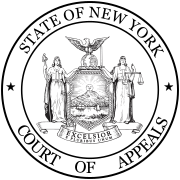40°45′14″N 73°58′53″W / 40.753836°N 73.981279°W
| Meinhard v. Salmon | |
|---|---|
 | |
| Court | New York Court of Appeals |
| Full case name | Morton H. Meinhard v. Walter J. Salmon et al. |
| Argued | December 4 1928 |
| Decided | December 31 1928 |
| Citations | 249 N.Y. 458; 164 N.E. 545; 1928 N.Y. LEXIS 830; 62 A.L.R. 1 |
| Case history | |
| Prior history | Judgment for plaintiff, New York County Supreme Court; affirmed as modified, 229 N.Y.S. 345 (N.Y. App. Div. 1928) |
| Holding | |
| Managing partner in a joint venture had a fiduciary duty to inform and allow the investing partner to compete to obtain an opportunity that arose from his status as a partner even though it would vest after the partnership's anticipated termination. New York Supreme Court Appellate Division affirmed as modified. | |
| Court membership | |
| Chief judge | Benjamin Cardozo |
| Associate judges | Cuthbert Pound, William S. Andrews, Frederick Crane, Irving Lehman, Henry Kellogg, John F. O'Brien |
| Case opinions | |
| Majority | Cardozo, joined by Pound, Crane, Lehman |
| Dissent | Andrews, joined by Kellogg, O'Brien |
Meinhard v. Salmon, 164 N.E. 545 (N.Y. 1928), is a widely cited case in which the New York Court of Appeals held that partners in a business owe fiduciary duties to one another where a business opportunity arises during the course of the partnership. The court holds that the fiduciary duty of communication was breached where a partner in a joint venture failed to inform his co-partner of a profitable opportunity that was offered by a third-party who was ignorant of the partnership. Furthermore, the duty of loyalty was breached where the partner appropriated to himself a benefit arising from his status as a partner without allowing his co-partner an opportunity to compete. This holding relates to the doctrine of corporate opportunity.